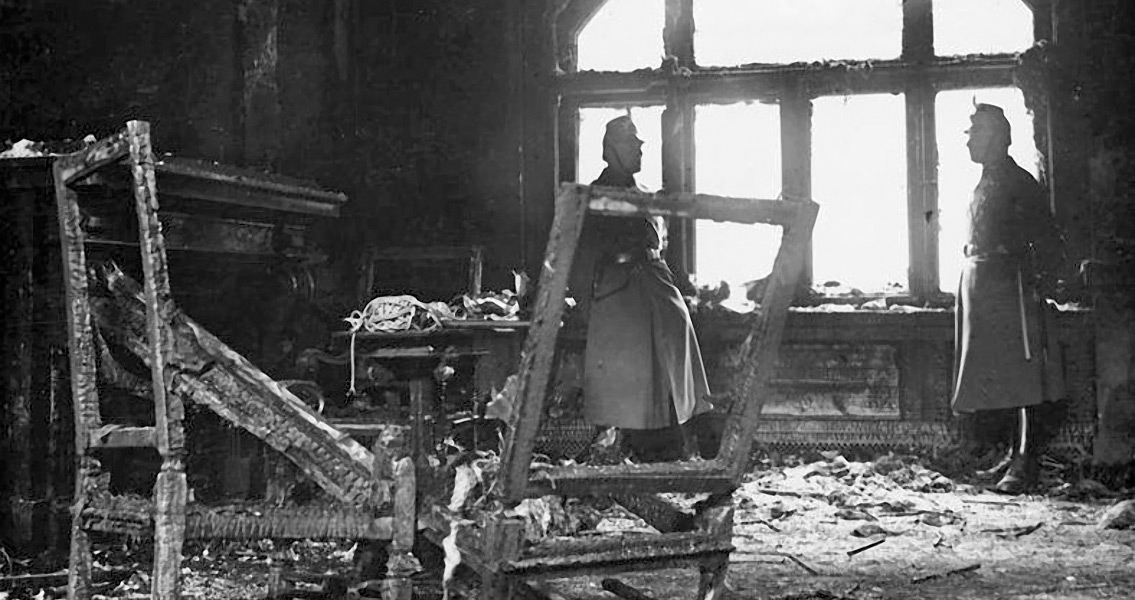<![CDATA[On the 27th February 1933 the Reichstag Fire took place. The burning of the German parliamentary building proved a key point in the rise of Hitler and the Nazi Party in Germany. The fire remains a source of conspiracy theories, with studies and debates still taking place about the series of events leading up to the fire and who was really responsible. The fire itself took place on the evening of the 27th. Adolf Hitler was having dinner at the home of Joseph Goebbels, when they received news that the parliamentary building had caught fire. They immediately set off for the Reichstag, and met Hermann Goering there. Rudlolf Diels, the head of the Gestapo in Berlin, arrived at the scene after the three leaders of the Nazi party. He later revealed that Goering had told him the fire was the start of a Communist conspiracy to overthrow the German government, while Hitler furiously declared that every Communist official "should be shot where he is found". Diels' account reveals just how swiftly the events were linked with a Communist uprising. At the scene of the fire, the Dutch Communist Marinus Van Der Lubbe was arrested by German authorities. Van Der Lubbe swiftly confessed to burning the Reichstag, and also insisted that he had acted alone. Van Der Lubbe was a known arsonist, and in the days before the Reichstag fire he had torched several other buildings. Despite Van Der Lubbe's protestations of working alone, other Communists were rounded up by the SA. The burning of the Reichstag proved the perfect justification for the Nazi party to launch a campaign against its greatest rival for power in Germany. The Nazis had won the election of 1932, making them the largest single party in the Reichstag and Hitler chancellor, however, they lacked a clear majority, meaning the Social Democrat and Communist Parties maintained a powerful veto. Following the continued ineffectiveness of the regime, another election was announced for the 5th March 1933. This context is vital when considering the significance of the Reichstag Fire. The Nazi's needed to gain total control over parliament, they also knew the upcoming referendum was a risk - they could just as easily lose seats as gain them. A consequence of the Reichstag Fire was that the March election took place in the shadow of the supposed Communist plot. The day after the fire, Hitler declared a decree for the 'Protection of the People and State', which temporarily suspended all constitutional rights relating to people and property, and allowed a brutal clampdown on Communists campaigning in Germany. The Nazi's still failed to win an outright majority in the election, but a few weeks later the Enabling Act was passed, transferring all legislative powers to the Reich Cabinet. Essentially, the widespread fear of a Communist plot allowed Hitler to swiftly replace democracy with dictatorship. It is the seeming convenience of the event's timing that has led many to question its narrative. Van Der Lubbe was found guilty of the crime, and executed in November 1932. However, the other defendants who were brought to trial were all acquitted by the German Supreme Court. This, combined with Van Der Lubbe's repeated insistence that he had worked alone, seemed to disprove the suggestion that there was a broader Communist Conspiracy at play. As such, many historians and observers have claimed that the only conspiracy involved was a Nazi one. A book released before the trial of the supposed arsonists had even begun was one of the first to claim that the fire was a Nazi conspiracy. The Brown Book, published by the Communist activist Willi Münzenberg, presented ninety pages of evidence arguing that SA officers had accessed the Reichstag via a tunnel connected to Goering's basement and started the fire. The officers then left Van der Lubbe to take the blame. At the Nuremberg trials, held after the Second World War, the Nazi General Franz Halder testified that he had heard Goering boast of his involvement in the fire. It should be noted however, that Goering denied any involvement during his own trial. The idea of a Nazi conspiracy carries a lot of weight, not least because they were able to take advantage of the fire so effectively. On the other hand, a considerable historiography exists that sits between the two explanations - the fire was not a Nazi plot, and nor was it a Communist one - Van Der Lubbe truly acted alone, as he had always claimed. The Nazi's were still guilty of using the fire as an excuse to install dictatorship in Germany, but it was an example of opportunism, rather than a sophisticated conspiracy. It is still unclear who was responsible for the Reichstag Fire. What is undeniable however, is that it played a key role in the end of democracy in Germany in the 1930s. Image courtesy of Wikimedia commons user: Bundesarchiv, Bild 102-14367 / CC-BY-SA]]>
The Anniversary of the Reichstag Fire
